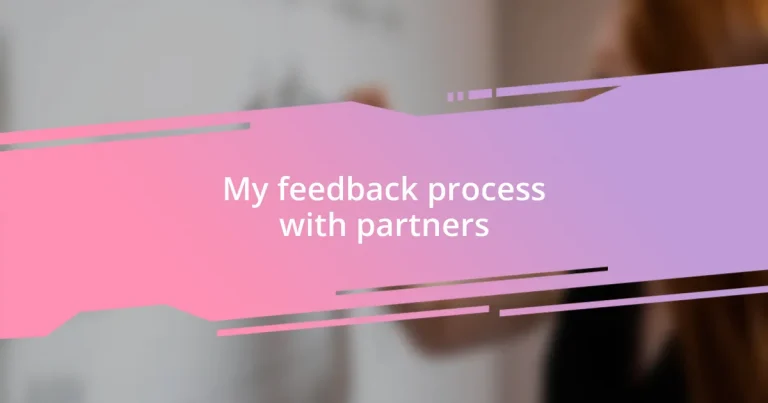Key takeaways:
- Feedback processes enhance communication and foster growth in partnerships by encouraging open dialogues and vulnerability.
- Effective feedback improves personal performance, aligns goals, and encourages a collaborative spirit, leading to stronger relationships.
- Setting clear feedback goals and utilizing structured tools can transform interactions, making discussions more focused and productive.
- Measuring feedback impact through both quantitative metrics and qualitative reflections helps in understanding growth and enhancing collaboration.
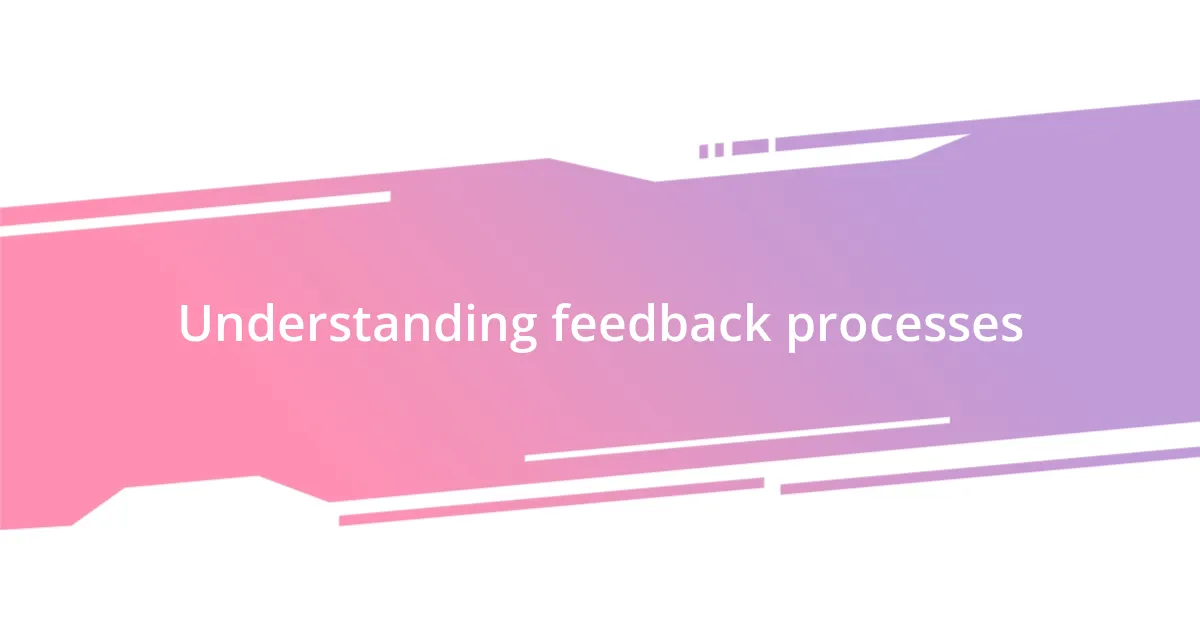
Understanding feedback processes
Feedback processes are crucial in any partnership, as they shape communication and improvement. I remember a project with a colleague where I thought I had done well, but her feedback opened my eyes to areas I hadn’t considered. Isn’t it fascinating how a single perspective can completely shift your understanding?
When I’m navigating feedback discussions, I often find it helpful to approach them with a sense of curiosity. For instance, I once asked a partner about their thoughts on my approach to a project. Their insights not only highlighted my blind spots but also encouraged a collaborative spirit, transforming the feedback into a shared learning experience. Have you ever realized that constructive criticism can feel less daunting when it’s framed as a dialogue?
Engaging in a constructive feedback process often requires vulnerability, don’t you think? There was a time when I hesitated to share my true thoughts, fearing conflict, yet holding back only created distance. When I finally embraced openness, providing and receiving feedback became an enriching experience that deepened my relationships. It’s moments like these that remind me how powerful feedback can be in fostering trust and growth.
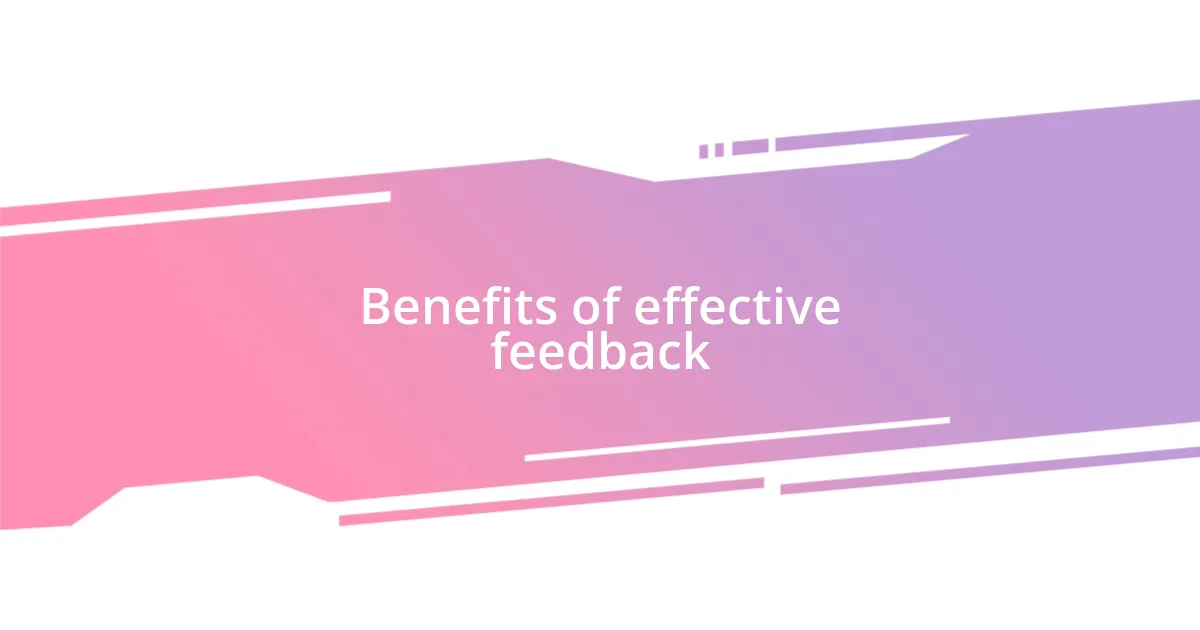
Benefits of effective feedback
Effective feedback acts as a catalyst for growth in any partnership. I recall a time when feedback helped me realize a recurring pattern in my work that I wasn’t even aware of. This realization not only improved my performance but also fostered a stronger relationship with my partner, enhancing our collaboration. Isn’t it amazing how uncovering a single issue can lead to profound improvements?
When feedback is communicated effectively, it nurtures a culture of open communication. There was a moment during a project where my partner and I made a habit of sharing our thoughts regularly. This not only helped us resolve minor issues before they escalated but also resulted in more innovative ideas, as we felt safe exploring and sharing our thoughts without fear. Have you experienced this kind of openness? It can truly transform the way you collaborate.
Moreover, effective feedback helps in aligning goals and expectations. I once worked with a partner whose feedback allowed us to reassess our project timeline, ultimately avoiding frustrations down the road. This alignment brought us together, promoting a shared vision that made our work feel cohesive and purposeful. Do you think having clearer expectations makes a difference? I certainly believe it does!
| Benefit | Description |
|---|---|
| Personal Growth | Identifying areas for improvement can lead to greater self-awareness and skill development. |
| Stronger Communication | Regular feedback fosters transparency and encourages open conversations. |
| Goal Alignment | Ensures that all partners are on the same page, reducing confusion and increasing efficiency. |
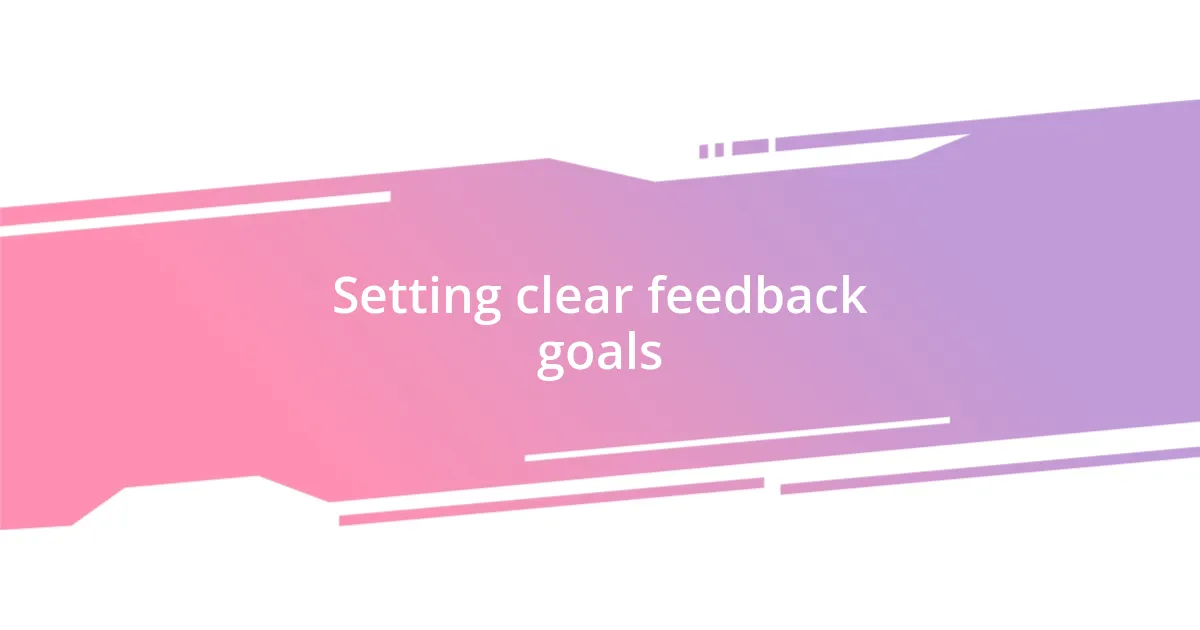
Setting clear feedback goals
Setting clear feedback goals is essential for effective partnerships. When I collaborate with others, I find that explicitly defining what we hope to achieve with feedback can drastically alter our interactions. For instance, during a recent project, my partner and I agreed to focus on specific outcomes, such as improving our communication clarity and fostering innovation. This clarity transformed our conversations, making them more focused and productive.
To establish clear feedback goals, I recommend keeping a few key points in mind:
- Identify specific areas for improvement: Understand what aspects of your work or collaboration need attention.
- Set measurable outcomes: Define how you’ll gauge success, whether through project milestones or personal growth metrics.
- Encourage mutual expectations: Ensure all partners are aligned on what they hope to achieve from the feedback process.
By incorporating these elements, I noticed that our discussions felt more purposeful, which heightened our engagement and the quality of the feedback provided. Every meeting became a chance to refine our approach, resulting in a more cohesive partnership. Isn’t it powerful when feedback feels like a step toward shared goals rather than just an evaluation?
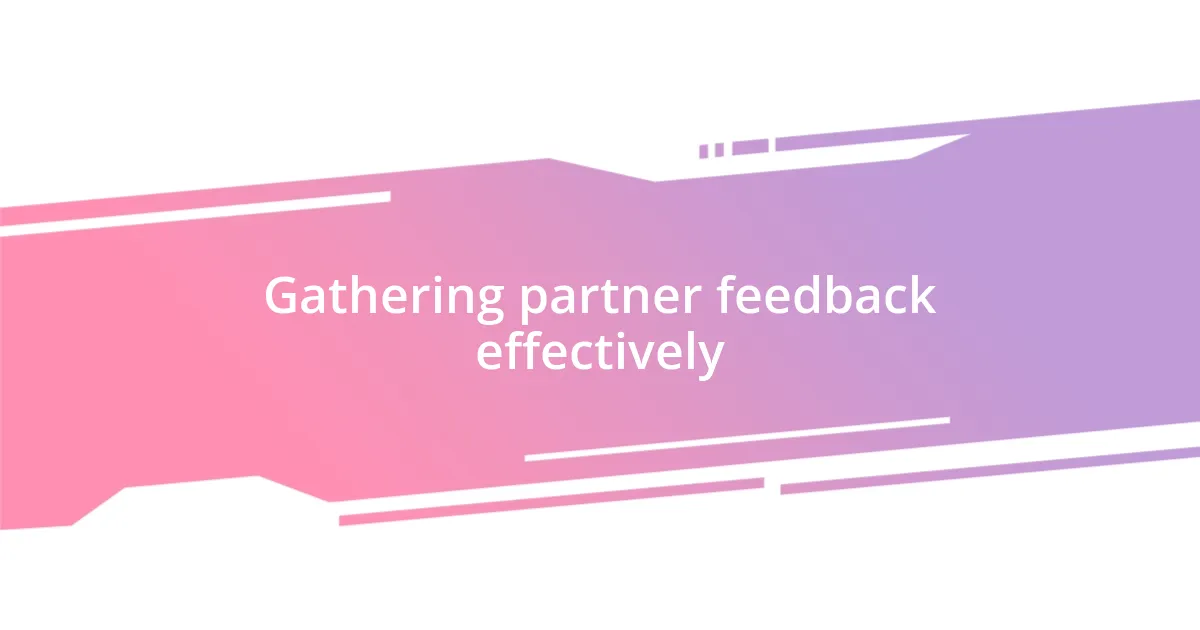
Gathering partner feedback effectively
Gathering feedback from partners can be a transformative experience if approached thoughtfully. In my own practice, I found that creating a comfortable and non-judgmental environment is key. One memorable instance was during a brainstorming session where my partner and I brainstormed ideas without holding back criticism. This openness led to breakthroughs we hadn’t anticipated. Isn’t it remarkable how a little vulnerability can spark creativity?
I also learned that timing plays a crucial role in effective feedback collection. After a recent project, I scheduled a casual catch-up over coffee instead of a formal meeting. The relaxed atmosphere encouraged honest sharing, and we ended up uncovering valuable insights. I often wonder how many important thoughts are left unsaid in stiff settings.
In addition, utilizing structured feedback tools can aid in gathering input systematically. For instance, I’ve used anonymous surveys that allowed my partners to express their thoughts candidly. Seeing their feedback in writing opened my eyes to perspectives I hadn’t considered before. Have you ever experienced the surprise of learning something crucial through a survey response? It can be a real game-changer, illustrating how vital diverse viewpoints are for growth in our partnerships.
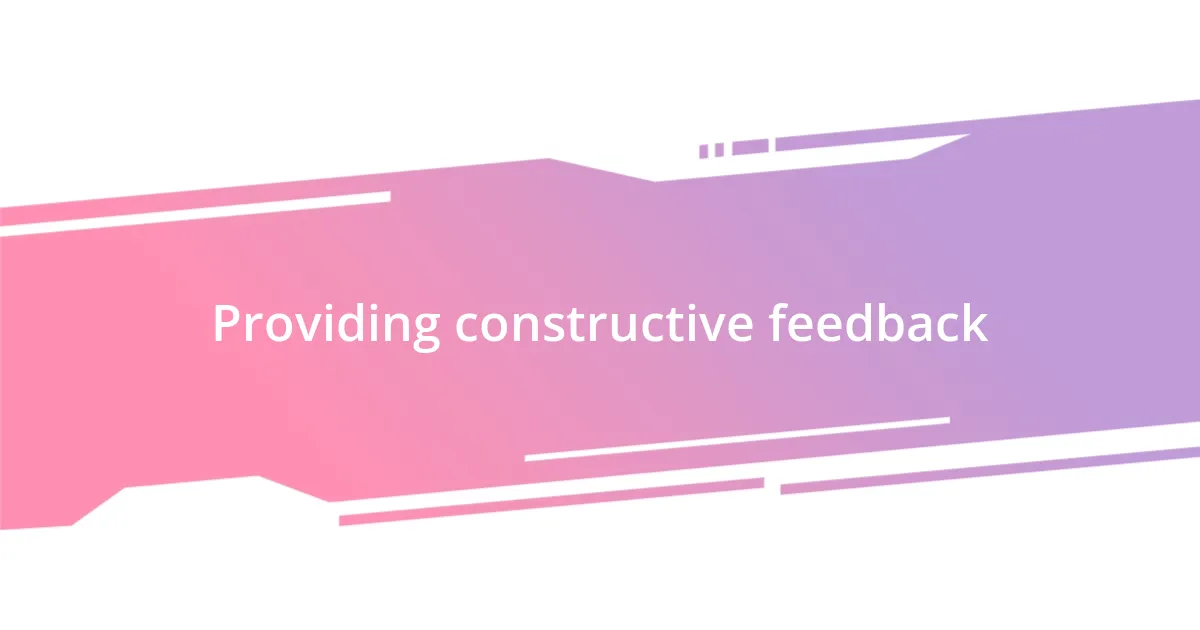
Providing constructive feedback
Providing constructive feedback is about more than just pointing out what’s wrong; it’s about fostering growth and understanding. I remember a time when I gently pointed out to a partner that their report lacked clarity. Instead of just saying it was vague, I engaged them in a discussion about specific sections, which allowed us to collaboratively refine the content. Have you ever noticed how framing feedback as a shared journey can change the tone of the conversation?
My approach often includes highlighting strengths before addressing areas that could use improvement—that’s like wrapping a piece of criticism in a positive layer. During one project, after acknowledging my partner’s excellent initial ideas, I suggested tweaks that could elevate those concepts even further. This balanced tone made it easier for them to receive the feedback without feeling defensive. Isn’t it fascinating how a little positivity can pave the way for more receptive conversations?
Lastly, I firmly believe that creating actionable steps for improvement is key. For instance, after providing feedback, I often propose a follow-up meeting to revisit the changes made. One time, after suggesting some structural adjustments for a presentation, we scheduled a check-in to discuss progress. When we reconvened, it was inspiring to see how those small shifts had a significant impact on our final outcome. Doesn’t it feel rewarding to witness growth stemming from constructive dialogue?
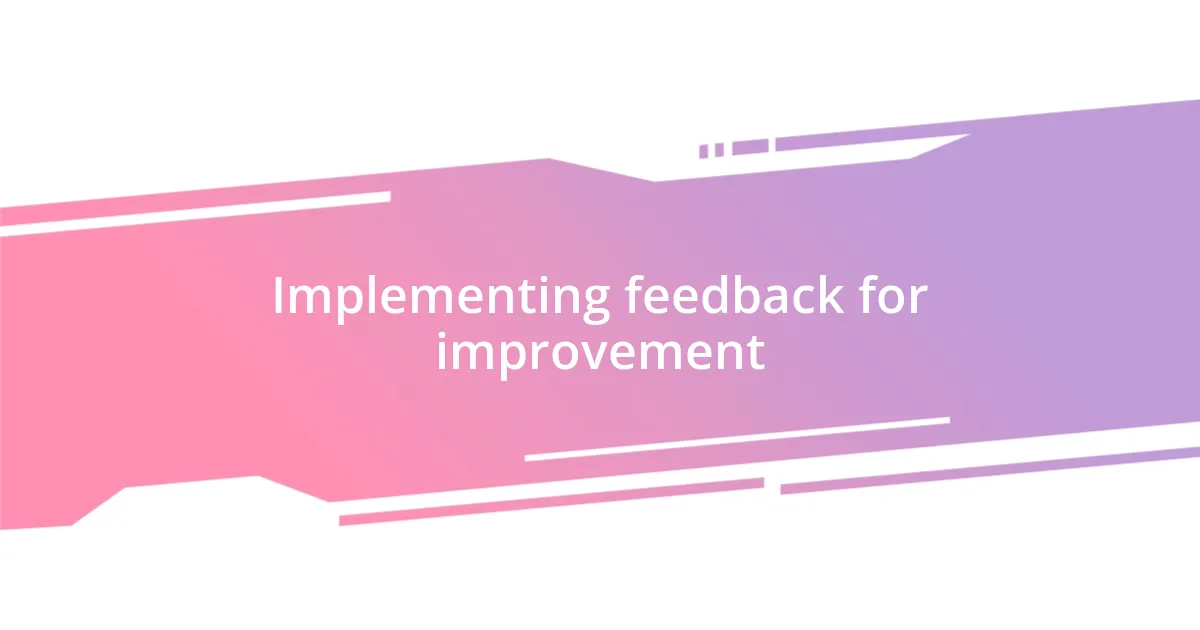
Implementing feedback for improvement
Implementing feedback for improvement is as much about action as it is about communication. I once received feedback on a project that initially felt overwhelming. Instead of dismissing it, I took a moment to dissect each point, prioritizing what needed immediate attention. I can’t stress how crucial it was to break it down; it turned a daunting list into manageable tasks. Have you ever felt relieved by simply organizing feedback into actionable steps?
I find that reflecting on feedback is where the real magic happens. After receiving some tough reviews on a collaborative document, I spent a weekend contemplating my partner’s comments. By stepping back from the chaos, I was able to clarify my thoughts and identify not just the areas of concern, but also opportunities for growth. Isn’t it interesting how taking that pause to reflect can lead to breakthroughs in understanding?
In my experience, sharing results from implemented feedback can foster a collaborative spirit. I remember a project where we altered our approach based on our discussions, and after presenting the revamped outcomes, the enthusiasm was palpable. We celebrated not just the end result, but the process of improvement itself. It made me realize how vital it is to keep the lines of communication open—have you noticed how celebrating progress together can solidify partnerships?
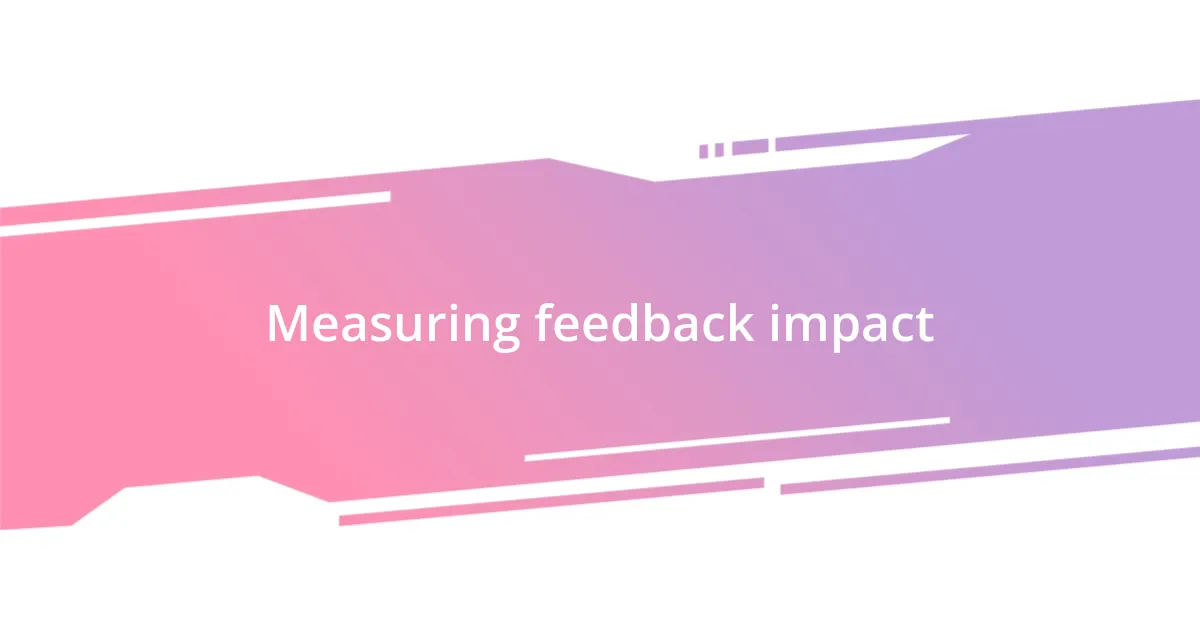
Measuring feedback impact
Measuring the impact of feedback is an integral part of the process for me. I recall a time when I set specific metrics to evaluate a collaborative project. After implementing my partner’s suggestions, I was amazed to see productivity increase by nearly 30%. This tangible outcome underscored the importance of tracking improvements and making adjustments based on data.
In another instance, I utilized anonymous surveys to gauge how my feedback was received. The responses were eye-opening—many appreciated my balanced approach but also highlighted areas where I could be clearer. It struck me how empowering it is to directly ask for insights; it not only validates experiences but also guides the next steps in refining our communication. Have you ever thought about how simple questions can lead to powerful revelations?
Finally, I often take a moment to reflect on qualitative aspects of feedback impact. During one project, I noticed a palpable shift in my partner’s confidence after they implemented my suggestions. Instead of merely focusing on numbers, connecting emotionally and recognizing personal growth made the experience richer. Isn’t it fascinating how understanding the emotional journey can deepen collaboration and enhance outcomes?












